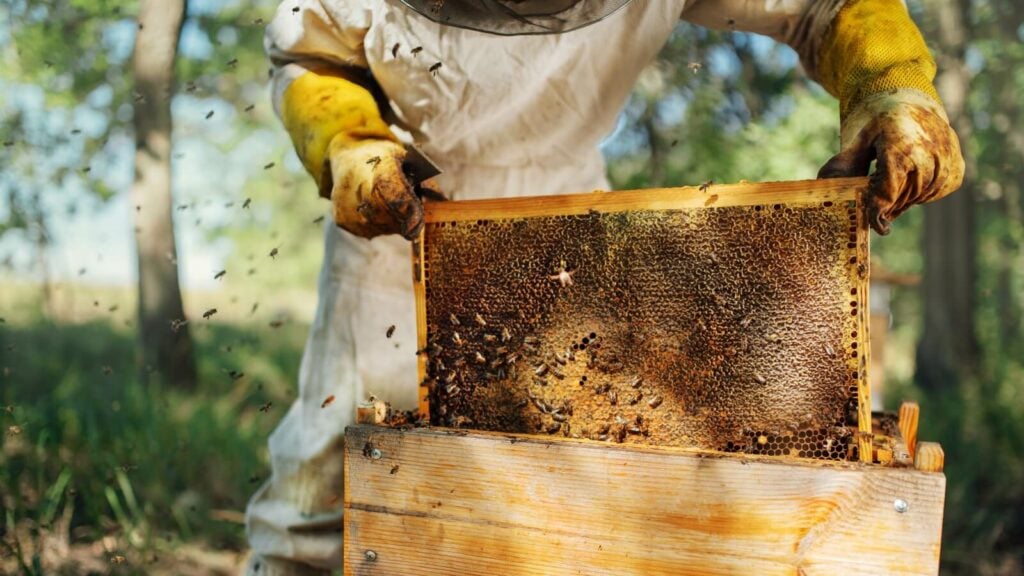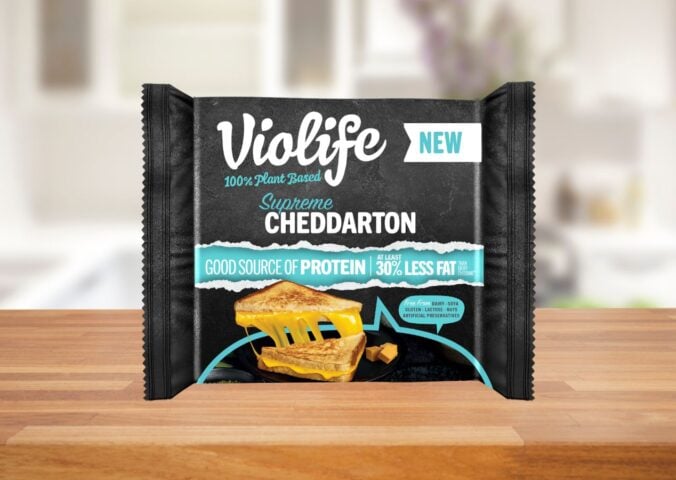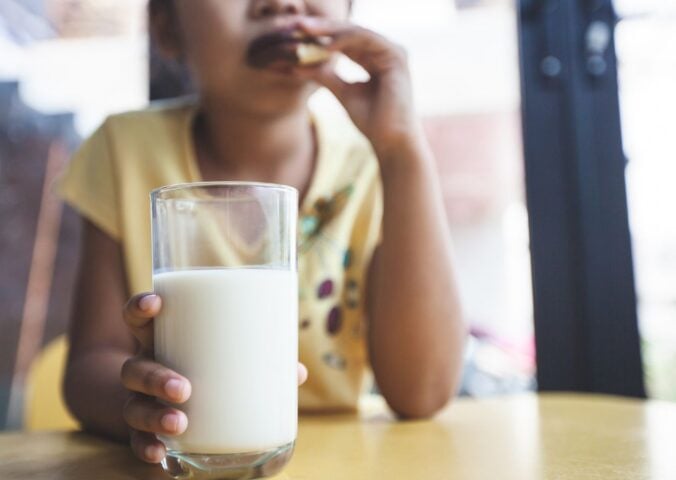Most people know that vegans do not eat dairy, meat, and eggs. But many are surprised to learn that honey is not vegan-friendly either. Honey is widely considered a cruelty-free “natural” food that does not harm bees, however animal rights advocates say there’s more to the story.
Here, we take a closer look at honey, how and why bees make it, and the impact of its production on the ecosystem. And, 17 plant-based honey substitutes to try.
Jump to section:
- What is honey?
- Why do bees make it?
- Why is honey not vegan?
– Do bees feel pain? - Is honey production cruel?
– Commercial crop pollination - Bee population decline
- What to use instead of honey
– Honey substitutes
– Vegan honey brands
What is honey?
Honey is a thick sticky substance created by bees as a source of food. It’s mostly sugar, with fructose and glucose making up around 70 to 80 percent. Water makes up the rest (approximately 17 percent), alongside small amounts of pollen and minerals.
This nutritional profile gives honey a sweet taste, which has led humans to use it in a variety of food and beverages for centuries, including teas, cakes, and sauces. Honey is sometimes found in cosmetics and other beauty products, too.
How and why do bees make honey?
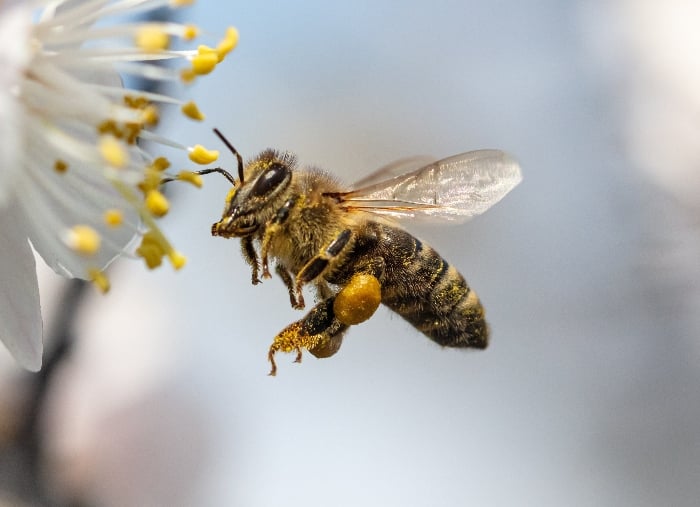
Bees feed on pollen and nectar, but honey is their single source of food during the winter months. Alison Benjamin, co-author of A World Without Bees and Good Bee: A Celebration Of Bees And How To Save Them, explains: “When there are no flowers or it’s too cold to get to them, the bees will starve.”
And so, bees collect nectar and pollen from flowering plants to make honey, which is then stored inside the hive for a rainy day (literally). “Nectar is the carbohydrates that fuel their flight. Pollen provides the protein they feed to their larvae so that they can develop into strong, healthy adult bees,” Benjamin explains.
A honeybee will visit up to 1,500 flowers to collect enough nectar to fill their stomach. When returning to the hive, the bee regurgitates and chews the nectar, turning it from complex to simple sugars.
They repeat this process thousands of times throughout the spring and summer. Yet a single bee produces just a twelfth of a teaspoon of honey in their lifetime – and every ounce is “fundamental” to their hive, according to the The Vegan Society. (Notably, it takes the pollination of two million flowers – and around 55,000 miles of bee flights – to produce a single pound of honey.)
“It is not an individual bee that the honey is feeding but the colony – made up of a queen and about 10,000 worker bees in the winter,” Benjamin explains.
How a beehive works
Beehives are highly organized communities centered around a “queen bee,” who is the sole fertile female in the colony and therefore responsible for laying all the eggs in the hive. These will predominantly be “worker bees,” who perform a wide range of tasks like tending to the developing larvae and regulating the hive’s temperature.
Inside the hive, bees use beeswax to create honeycomb, which houses the eggs and developing bees, alongside an inventory of honey and pollen. Bees construct the honeycomb in hexagonal cells to both maximize storage space and structural stability.
Why is honey not vegan?
Since honey production involves the use of non-human animals, it is not suitable for vegans. People following a vegan lifestyle avoid contributing to animal exploitation as much as is possible in a non-vegan world, meaning they do not use, consume, or wear products made with or using animals.
Just as cow’s milk is intended for calves, not cheese, bees create honey to sustain their colonies, not humans. The Vegan Society sums it up: “honey is made by bees for bees.”
Are bees sentient? Do they feel pain?
Compared to their mammalian peers, insects like bees often receive little concern from humans about their welfare. This is largely due to a lack of understanding about the animals and their sentience, including their ability to feel emotion and pain.
The latest research in the field suggests bees are indeed sentient, and experience a host of sophisticated emotions. In his 2023 book What a Bee Knows, entomologist Stephen Buchmann states that bees are “self-aware,” highly intelligent, and possess a “primitive form of consciousness.”
The Guardian reported on the book earlier this year, saying bees’ apparent ability to recognize different human faces, process long-term memories while sleeping, and feel optimistic, playful, and scared raises “complex ethical questions” about our treatment of them.
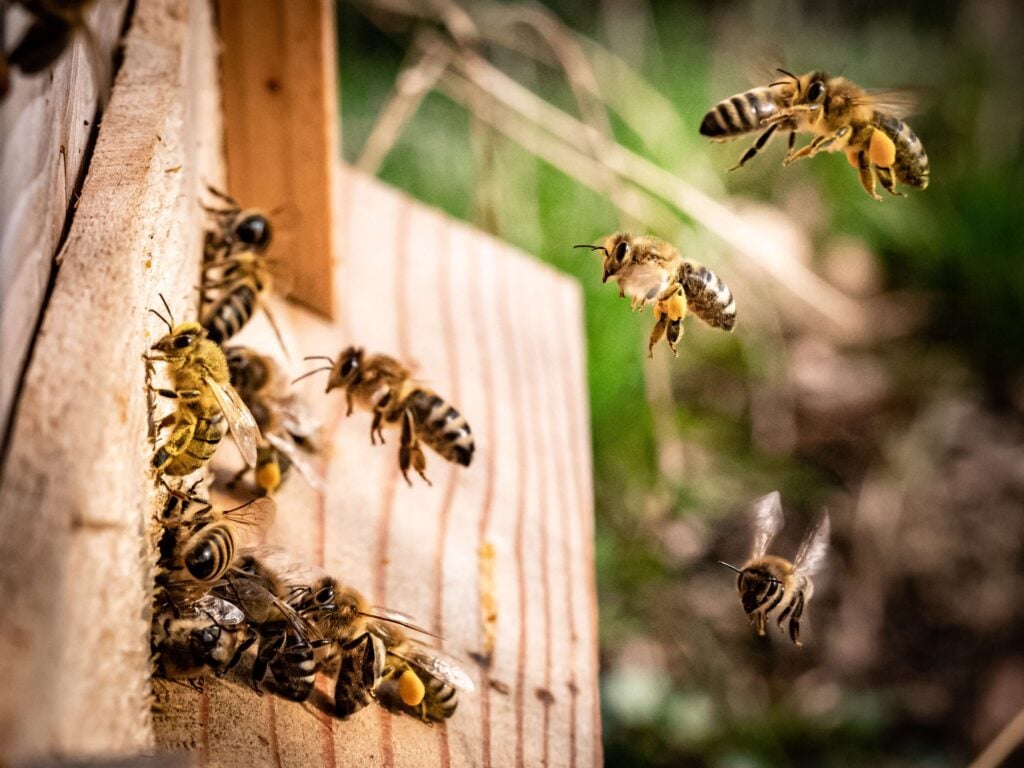
Similar concerns were sparked the year prior, when a study from the Queen Mary University of London concluded that bees feel pain, and make decisions about whether to suffer for food or not. Researchers said that the findings indicate humans have “an ethical obligation not to cause [bees] unnecessary suffering.”
Is honey production cruel?
Bees, of course, build hives and carry out their nectar and pollen routines naturally in the wild. But in order for humans to access their honey, and generate more, artificial ecosystems are used to supercharge the process.
This includes keeping queen bees confined in a filing cabinet-style structure, by using a piece of mesh that worker bees can pass through but she cannot, or clipping her wings. The structure contains horizontal sheets, where, because the queen bee is trapped nearby, the bees build their honeycomb. In the natural world, bees can shape their honeycomb around various surfaces and to fit different sized spaces.
To harvest the honey, beekeepers either smoke the bees to subdue them, or trap them with a clearing board over one or two days. Others kill the colony altogether.
Oftentimes, beekeepers replace the honey they remove with a sugar water substitute. This practice prompts honeybees to overwork themselves to replace the missing honey. Meanwhile, the sugar water lacks the nutrients, fats, and vitamins that bees need to be healthy.
PETA UK’s director, Elisa Allen, maintains that the honey industry “abuses bees for profit.”
“Many beekeepers use inhumane methods to ensure their own safety and to reach production quotas, including cutting off the queen bee’s wings so that she can’t leave the colony and killing drones to extract semen in order to inseminate the queen,” Allen explains. She adds that honey is “their fuel and their life’s work and rightly belongs to them, not us.”
Commercial crop pollination
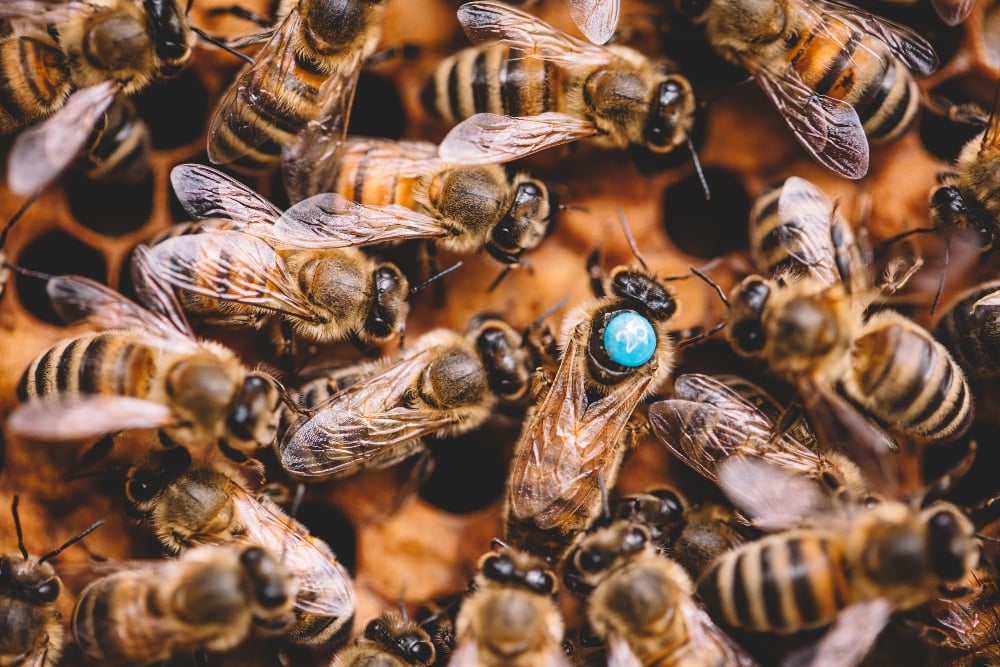
Keeping beehives is “big business,” according to the USDA, and not just for honey production. Many commercial beekeepers hire out their honeybees to farmers for crop pollination. The hives are transported to various farms, sometimes thousands of miles apart, in hopes that the bees will pollinate the crops growing nearby.
Despite not being native to the US, honeybees now pollinate more than $15 billion worth of crops there every year, the USDA says. This has led the government agency to consider commercial honeybees alongside “livestock.” Yet a significant number of bees don’t survive the crop pollination process that it oversees. In fact, more bees die every year in the US than all other animals who are raised for food combined, including fish.
“In the US, large-scale beekeepers regularly report at least a third of their colonies die each year,” Benjamin says. Additionally, 2022 research found that honeybee lifespans are now 50 percent shorter than they were 50 years ago.
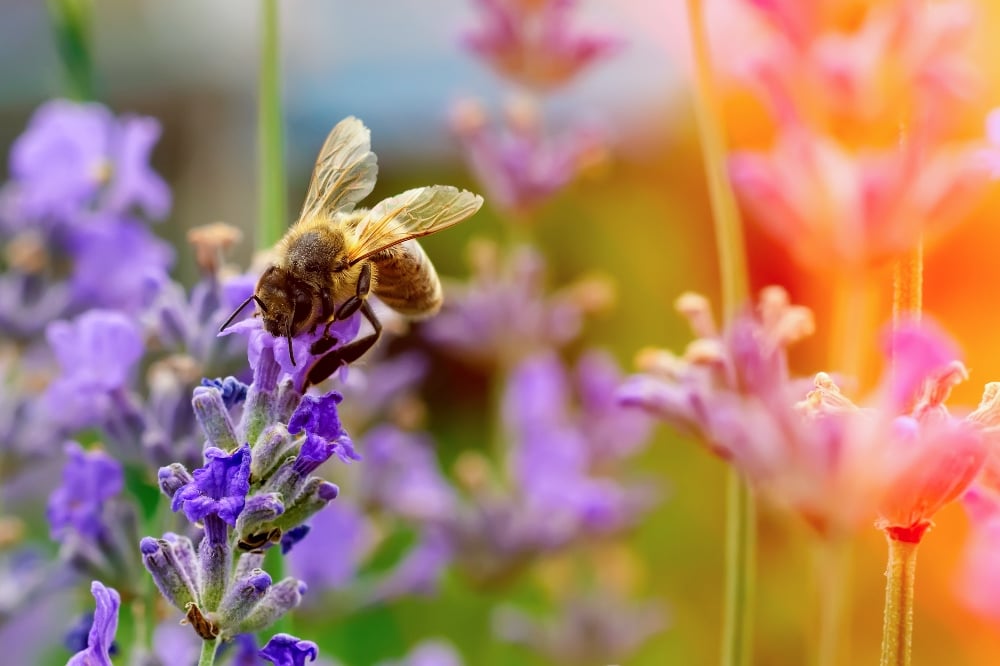
Benjamin warns that forcing bees to gather pollen and nectar from “vast swaths of a single crop deprives them of the far more diverse and nourishing diet provided by wild habitats.” Transferring the animals between locations also “continually boomerangs honeybees between times of plenty and borderline starvation,” she notes.
‘Bee milk’
Humans also use bees to make royal jelly, also called “bee milk.” The substance is similar to gelatin and is sometimes found in non-vegan cosmetics. It’s harvested from the glands of queen honeybees. Author Benjamin says this is the “most cruelly produced” bee-derived product as it can only be produced on an industrial scale by bees “treated purely as royal jelly machines.”
Why are bee populations declining?
There’s no doubt that bee species are struggling. Out of the 2,000 wild bee species in Europe, one in 10 is facing extinction, The Soil Association states. And globally, an estimated one in six bee species is regionally extinct, whilst more than 40 percent are vulnerable to extinction.
Outside of honey, various human behaviors and industries are driving bee populations down. The use of pesticides, especially the insecticide neonicotinoid, on crops for human and “livestock” consumption is thought to be a leading cause of falling bee populations.
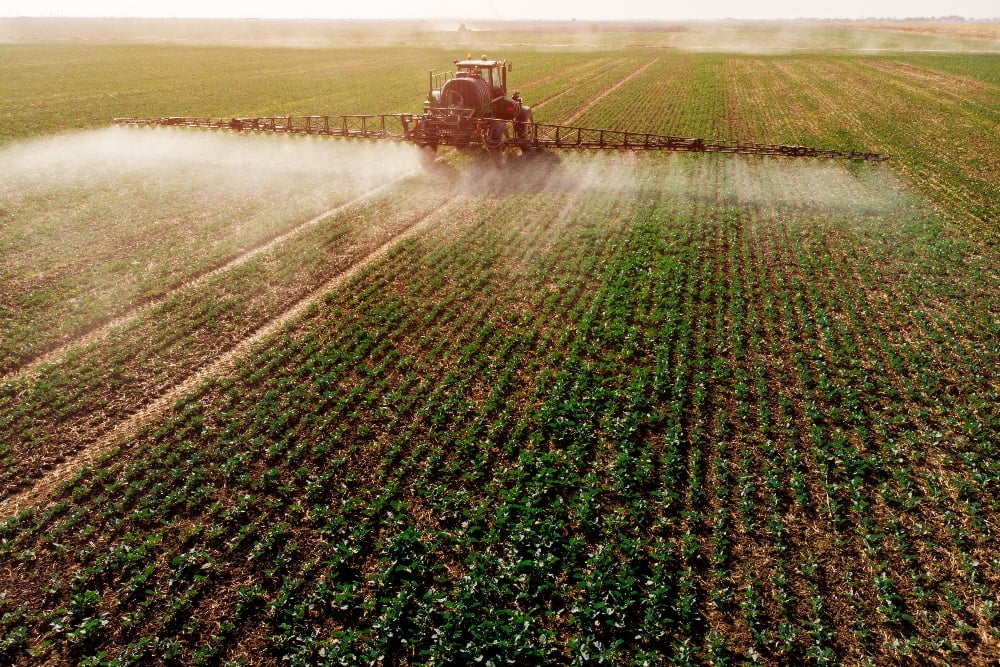
In addition, habitat destruction and the worsening climate crisis is placing extreme pressure on bees and other insects.
What to use instead of honey?
There are lots of honey substitutes out there, including natural plant-based alternatives to keep in your kitchen and vegan honey products you can buy. In no particular order, here are 17 plant-based swaps for honey that are bee-free, but just as sweet as the real thing.
Plant-based honey substitutes
1. Maple syrup
Tapped from maple trees, maple syrup has a sweet, earthy flavor with hints of caramel and toffee. It’s perfect for drizzling on pancakes, waffles, and oatmeal, or as a sweetener in baking.
2. Date syrup
Dates are frequently used in cakes and sweet treats but they can also be made into syrup by soaking, boiling, and sieving. Date syrup has a rich, caramel-like sweetness and can used to sweeten smoothies, yogurt, energy bars, and desserts.
Biona makes an organic date syrup, or try your hand at making your own using Lazy Cat Kitchen’s recipe.
3. Agave nectar
Agave nectar comes from agave plants, which are succulents native to Mexico. It has a mild, neutral taste that works well in beverages, dressings, and as a substitute for honey in recipes. The syrup contains less glucose than refined sugars and is great way to sweeten a cup of tea.
The Groovy Food Company produces a wide range of agave nectars, with flavors like Blueberry, Cinnamon, Strawberry, and Vanilla.
4. Rice syrup
Rice syrup, also known as brown rice syrup and rice malt syrup, has a mildly sweet and slightly nutty taste. It’s made from whole grain brown rice, is gluten-free, and is sticky like maple syrup. Brown rice syrup is of Chinese origin, and is used in sweet and savory dishes alike.
5. Barley malt syrup
Like brown rice syrup, barley malt is the concentrated sweetener from whole grain barley. It has a mild, sweet, and nutty flavor. People often use it in breads, desserts, or to make malted drinks.
6. Coconut nectar
This nectar comes from the sap of coconut trees and has a gentle coconut flavor. Minimally processed, it is widely considered purer than syrups made from coconut sugar. It can be drizzled on pancakes, stirred into coffee, or made into glazes.
7. Molasses
A naturally rich source of plant-based iron, molasses is exceptionally sweet. It’s got a strong bite to it too, making its flavor distinct and slightly smoky. Use it in your favorite baking recipes, but ideally halve it with another more neutral sweetener like rice syrup or agave nectar. It works well in gingerbread cookies, dark bread, and barbecue sauces.
8. Sorghum syrup
Sorghum syrup is made from the grassy sorghum plant and resembles molasses. It has earthy tones, and can help add sweetness to baked goods.
9. Fruit syrups
Concentrated fruit syrups can work as honey substitutes in baking recipes. Or, mixed with maple for a sweet topping to your pancakes, waffles, or toast.
10. Raw sugar
Swapping out liquid honey with raw sugar in baked goods takes a bit of finessing but can be done. You typically just need to up your liquid content.
11. Applesauce
Applesauce provides natural sweetness and moisture for baked goods like muffins, cakes, and cookies. You can also use it as a spread.
Vegan honey brands
12. Herbivore’s Honi
The South Africa-based food brand and online store Herbivore sells its own vegan honey, called Honi. It’s free from preservatives and made with pressed apple juice, cane sugar, and lemon juice.
“Rest assured no bees were harmed in the making of this yummy honi,” the brand says.
Learn more about Herbivore here
13. Bee Free
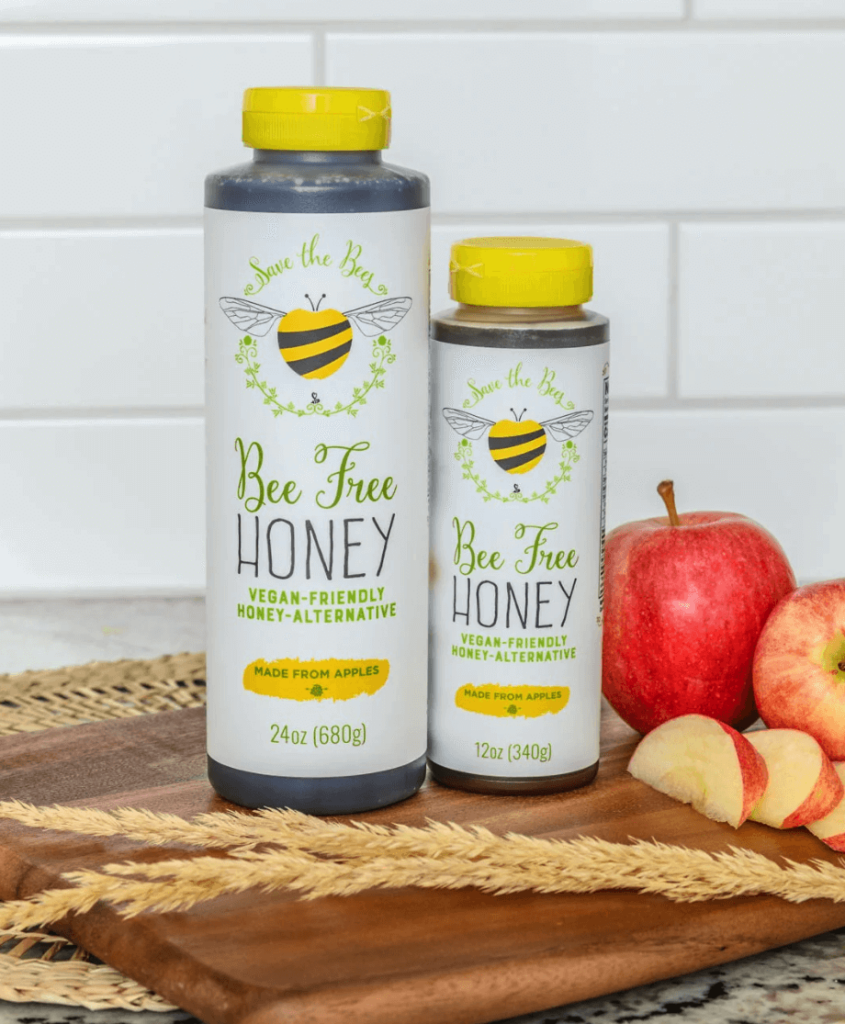
This US-based vegan honey is organic and gluten-free. It’s made from apples, and can be used a substitute to bee honey, agave, and sugar, or as a smoothie base.
Learn more about Bee Free here
14. ULTxBEE via VeganDukan
Online food platform VeganDukan, based in India, brings together plant-based businesses to cater to “the increasing demand for ethical consumption.”
It stocks a vegan honey alternative from UltxBEE, which claims to spare more than 400 bees per bottle. UltxBEE makes it with apple juice and cane sugar, and says it works in everything from smoothies to teas to sandwiches.
15. Bumble bloom
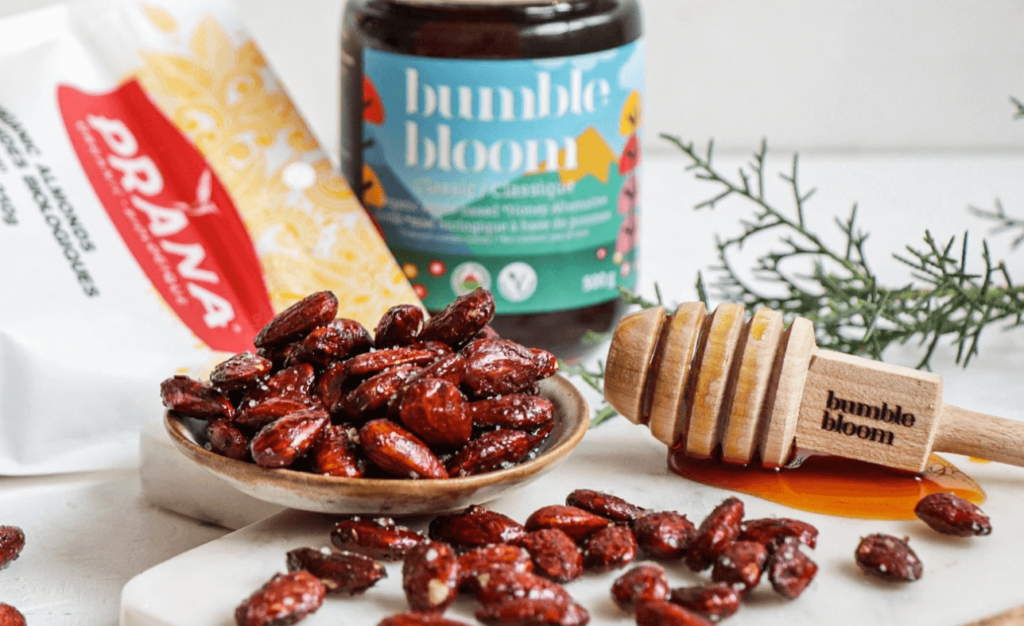
Montréal-based brand bumble bloom makes its vegan honey with organic cane sugar and apple juice. You can use it in all the ways you’d use bees’ honey, including sweet and savory dishes and drinks, in a 1:1 ration for conventional honey.
Learn more about bumble bloom here
16. Plant Based Artisan’s Honea
In the UK, food creator Plant Based Artisan sells a variety of vegan replacements for typically animal-derived foods.
Its Vegan Honea contains prebiotics, and is available in a variety of flavors such as Lavender, Rose, Thyme, Elderflower, and Orange Blossom. Plant Based Artisan also makes vegan caramel and “qurd.”
Learn more about Plant Based Artisan here
17. Mellody by MeliBio
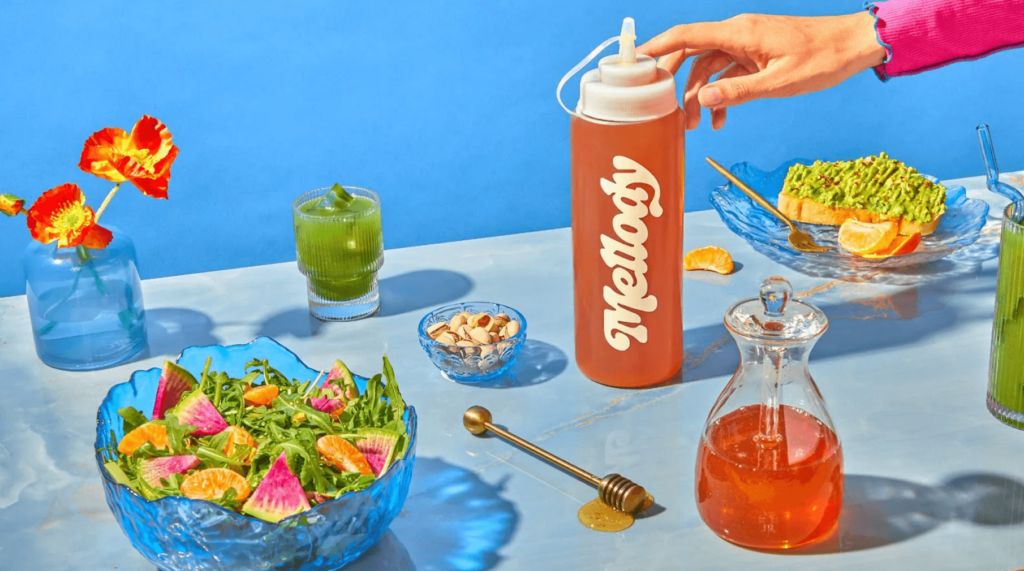
MeliBio is behind what’s thought to be the world’s first vegan honey with the same molecular composition as bee-derived honey. Called Mellody, the company hopes the honey will replace its traditional counterpart across various categories, including food, beverages, and personal care products.
Mellody is gluten-free and, like honey, is made with fructose and glucose. The brand says the end result tastes and performs just like bee honey.
Learn more about Mellody here. Listen to MeliBio’s founder speak about the future of honey on the Plant Based News podcast below
—
If you purchase something through a link on our site, Plant Based News may earn a commission, which helps us to provide our free services to millions of people each week.
